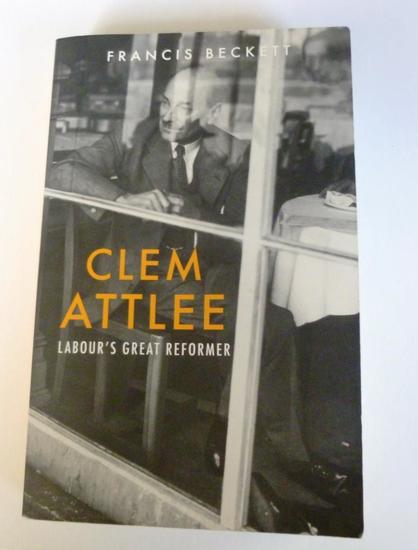
I’ve voted Labour all my life, except for a period after Tony Blair led us into war on Iraq, and even then, could not have voted Conservative. We watched the news as a family when I was young, and I have a clear memory of the Labour politicians of my youth: Harold Wilson, Barbara Castle, Dennis Healey (I bumped into him once on Charing Cross Road and he gave me a lovely twinkly smile from beneath those bushy eyebrows). They were the bright young things when Clem Attlee was Prime Minister, and although I knew his name, I was sadly unaware of the extent of this man’s huge contribution to the quality of life for British people over the last 70 years. After reading Francis Beckett’s beautifully written and accessible biography of the man, I feel better informed.
Clem Attlee was a small, quiet man, from a middle-class background. He was educated at Haileybury, a boarding school, and Oxford, following his father into a law practice. Had it not been for some voluntary work he undertook in the East End of London, this ex-Major, who saw active service in the First World War (he was the last but one soldier to leave Gallipoli when it was evacuated), might have lived an altogether different life.
One evening in 1906, Attlee went along with his brother on a visit to a youth club in Durham Road, Stepney. Haileybury House had been built by old boys of their former school who had decided, in 1890, to do something to help clergy active in the working-class areas of the big cities. One of the growing influences leading to this work was a pamphlet published by the Revd Andrew Mearns in 1883 - The Bitter Cry of Outcast London: An Inquiry into the Condition of the Abject Poor.
A shy young man, Attlee found the evening uncomfortable, but he learned enough to want to come again - the start of a process which opened his eyes to the appalling conditions suffered by those less fortunate than the prosperous Edwardian middle and upper classes, and the real meaning of poverty. His involvement increased from that night on - he felt for the first time in his life he was doing something with a purpose. He realised, as Andrew Mearns had written, that only large-scale action by the state could have any serious impact - unless society was organised so as to eliminate it, the wretchedness he saw around him would continue for ever.
By 1907, Attlee was a socialist, and he began his political career as a member of the Stepney branch of the Independent Labour Party. He very quickly took on the onerous and painstaking duties of branch secretary, giving his time and skills unstintingly. His closeness and work with the ordinary East End people and orderly upward progress through the rank and file of the local Labour group gave him an invaluable insight into their real problems, aims and ambitions. As Beckett relates:
'He took on all the humble, time-consuming jobs which have to be done, and which ambitious politicians generally consider are for lesser mortals, because, like Jim Callaghan, Clem Attlee liked all that. He cut up loaves to feed dockers' children during the 1911 dock strike, and stood at the bottom of Petticoat Lane with his brother Tom holding collecting boxes during the Irish Transport and General Workers' Union strike in 1913. He carried the Stepney Independent Labour Party branch banner on demonstrations through Central London. He went to court to plead mitigation when a half-starving boy was caught thieving.'
Beckett’s book outlines the life of a man who dedicated himself to working, for 16 hours a day for 45 years or so, for the good of the many, not the few. He became Mayor of Stepney, then its MP in 1922, a junior minister in Labour governments in the 20s and 30s, and party leader in 1935.
Attlee's commitment to realising his ambition of bringing about fundamental changes for the working-classes achieved, with his fellow Labour party workers, the radical creation of what we benefit from today. Most people of my generation (born in the 1950s) and those since have no knowledge or experience of what life was like before the welfare state - we’ve taken it for granted.
He was in many ways, a very unusual man. He led a quiet and modest home life, dedicated to his wife and children, never ‘taking work home’ to his family. He liked mending things in his spare time. He never read the papers or watched television. He worked steadily towards his aims, not swayed by the opinion of others. He was not a pacifist, though his older brother Tom was a conscientious objector, but had been appalled by the waste of life he witnessed in the Great War, and was a passionate supporter of the League of Nations and later the United Nations. His early experience of social work contributed to his writing The Social Worker,and teaching the subject at the LSE. He had very definite views about charity: he thought that if a rich man wanted to help the poor, he should pay his taxes willingly, not dole out money at whim. He wrote:
Charity ‘tends to make the charitable think that he has done his duty by giving away some trifling sum, his conscience is put to sleep and he takes no trouble to consider the social problem any further’.
Attlee served in Churchill's coalition government as Deputy Prime Minister during the Second World War, effectively running the country while Churchill concentrated on the business of fighting the war. Attlee was a staunch patriot, but once the war was over, he had an iron resolve to ensure that, unlike the aftermath of the First World War, when so many were thrown onto the streets, this time the opportunity to effect real change in the social welfare of the majority of the British people would not be lost. After the war, Attlee led the most influential reforming government of the last century, implementing the recommendations of the Beveridge Report, establishing the NHS and nationalising a fifth of the UK economy including the coal mining and steel industries.
There are many similarities between Clem Attlee and Jeremy Corbyn - both suffered/suffer at the hands of the media - in Attlee's case, the rich owners of large-circulation newspapers. Both had to contend with members of their own party complaining that they weren't leadership material, and regularly plotting to replace them. The more things change, the more they stay the same, as the saying goes!
I believe that if Clem Attlee was alive today, he would be horrified at the way his life's work has been steadily undermined in the intervening years, a process begun during the Margaret Thatcher years, of course, and now being greatly accelerated.
If you need just one out of many reference points from a welter of current revelations about how the welfare state and NHS are being relentlessly deconstructed, please read this article about the Naylor report, about which many of us had been ignorant until this week!
www.independent.co.uk/news/health/naylor-report-tory-nhs-privatisation-healthcare-flog-off-conservatives-theresa-may-election-2017-a7766326.html
If you have more time available, and I can promise you, it will be very worthwhile reading it, I highly recommend you read Francis Beckett's book. Towards the end of it, there is a little story of an incident, near the end of Attlee's life, which illustrates his modesty and humility. In 1912, the London School of Economics initiated took over a small School of Sociology, and Attlee was appointed its very first lecturer. In 1962:
'The LSE's Social Administration Department, where he had once taught, sent round a standard invitation to all of its former staff to celebrate its fiftieth anniversary. The organisers thought that the early staff members had died, but just as the platform was settling down in the Shaw Library, someone noticed a small, elderly man arriving inconspicuously and taking a seat at the back. Bernard Crick remembers: 'One of the platform party ran to the back in embarrassment to apologise and try to persuade him to come up to the front. He refused, or rather demurred. The audience, as he was recognised, rose to its feet and applauded. Only then would he join the platform. Afterwards they asked when his car was coming. "No car, came from Kings Cross on the 68 bus. A very reliable route." They had great difficulty persuading him to take a lift back.'

 RSS Feed
RSS Feed
